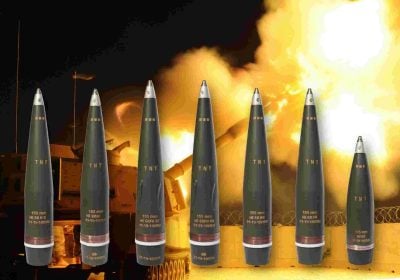Ukraine Is Ammunition-starved, and the West Simply Cannot Keep Up with Its Pledges

All Global Research articles can be read in 51 languages by activating the Translate Website button below the author’s name.
To receive Global Research’s Daily Newsletter (selected articles), click here.
Click the share button above to email/forward this article to your friends and colleagues. Follow us on Instagram and Twitter and subscribe to our Telegram Channel. Feel free to repost and share widely Global Research articles.
***
While Western discussions have focused on sending sophisticated weapons to Kiev, Hal Brands, a Henry Kissinger Distinguished Professor at Johns Hopkins University School of Advanced International Studies, argues that what Ukraine needs the most, besides air-defense systems, is artillery ammunition. He describes the current conflict as an artillery-centric one: “if Kiev can’t find enough artillery pieces and ammunition, especially 155mm shells, it will be at a dire firepower deficit along the conflict’s front lines.”
Already on March 29, Earle Mack, former US ambassador to Finland, writing in a piece for The Hill, described the current confrontation as proxy attrition warfare, that is one which seeks military victory by wearing down the enemy. He worried that Ukraine seemed bound to tire out first. Things have not gotten much better for Kiev, so far.
A July 23 New York Times story, by former Marine infantryman Thomas Gibbons-Neff, based on “dozens of visits to the front line” quotes a Ukrainian commander: “we’re trading our people for their people and they have more people and equipment.” According to the story, “Ukraine has made marginal progress in its ability to coordinate directly between its troops closest to Russian forces on the so-called zero line and those assaulting forward.” Moreover, the country’s artillery is in short supply, and “a mixture of munitions sent from different countries” is employed. The thing is that accuracy varies greatly between them and the Ukrainians need to use more ammunition. In addition, according to the same news report, “some of the older shells and rockets sent from abroad are damaging their equipment and injuring soldiers.”
Rather than using the complex military communication equipment, Ukraine’s troops employ “less sophisticated, but easier-to-use programs like smartphone messaging apps, private internet chat rooms.” Most of this system is dependent on Starlink satellite internet, and therefore it takes longer to communicate important military information when the units are assaulting and a Wi-Fi router is absent. In this case, unbelievably, “attacking troops have to reach someone with an internet connection to call for support.”
Regarding ammo, the problem is that US authorities themselves estimate that Moscow is capable of producing “1 million rounds of 152mm artillery ammunition per year.” The US, in contrast, produces merely a seventh of that, according to Hal Brands.
Right now, the US itself needs to purchase conventional artillery ammunition from its South Korean ally. In what Brands describes as a “desperate global scavenger hunt for munitions”, Washington has also been seeking ammo from Japan, as well as “repositioning rounds stored in Israel to Ukraine.”
Europe’s stockpiles are in no better shape. According to the International Institute of Strategic Studies, NATO European states armed forces are “hollowed out, plagued by unserviceable equipment and severely depleted ammunition stocks.” Bloomberg’s journalist and military historian Max Hastings writes that, over a year ago, Berlin had committed itself to €100 billion to rebuild its worn out forces. So far, however, only an estimated 1% of that has been spent. The German National Security Strategy, last month, stressed the weakness of Germany’s economy. According to Hastings, the “political will” to strengthen their armed forces is “absent” not only in Germany, but also in other European countries.
As I wrote before, the problem for Europe goes way beyond depleted weapons stockpiles: for it to rearm itself, re-industrialization is badly needed, something which, quite ironically, Washington itself has consistently opposed via its subsidy war against the European bloc. In addition, Europe, with its heavily diffused and fragmented defense, lacks a European Union common defense market and a legal and bureaucratic framework, as Sophia Besch (a Carnegie Endowment for International Peace fellow), and Max Bergmann (former member of the US Policy Planning Staff and Director of the Eurasia Program at the Center for Strategic and International Studies) write.
Britain’s industry today faces many difficulties, and the same thing happens with other European nations – manufacturers badly need funding expansion and governments are increasingly growing “tired” of the conflict’s costs.
As for the US, lecturer in History at Yale Michael Brenes argues that America’s own “war machine” is “broken”, with privatizations and several problems. He paints a picture of “shortages in production”, and “interruptions in supply chains”, all of which have compromised Washington’s ability to “deliver weapons to Ukraine.”
To sum it up, the current state of affairs, with a Western deindustrializations crisis, makes it very difficult for the political West to pursue its proxy attrition war. It simply cannot produce all the weapons it is pledging Ukraine. For the West, in fact, it is already a challenge to provide Kiev with enough ammunition.
*
Note to readers: Please click the share button above. Follow us on Instagram and Twitter and subscribe to our Telegram Channel. Feel free to repost and share widely Global Research articles.
Uriel Araujo is a researcher with a focus on international and ethnic conflicts.
Featured image is from InfoBrics

